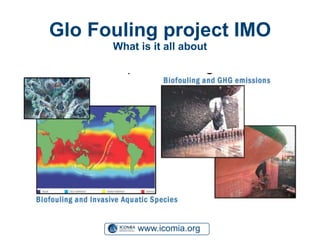Glo fouling boero rai peter fr
- 1. www.icomia.org Glo Fouling project IMO What is it all about
- 2. www.icomia.org Glo Fouling project IMO What is it all about
- 3. www.icomia.org Glo Fouling project IMO What is it all about
- 4. www.icomia.org Glo Fouling project IMO What is it all about
- 5. www.icomia.org Glo Fouling project IMO some important facts • Oceans cover 70% of our planet • Nearly 50% of the world’s population living in coastal areas • The transfer of Invasive Aquatic Species (IAS) through biofouling is a global environmental problem • Biofouling is described as the undesirable accumulation of microorganisms, plants, algae and animals on submerged structures (especially ships’ hulls). • But also transfer of IAS’s by human actions (caused by people): More people means more travel.
- 6. www.icomia.org Glo Fouling project IMO some important facts  Increase of IAS’s = increase of Loss of Biodiversity! • Because of the technical, scientific, environmental and economic implications, the biofouling issue is one of the most complex pollution threats faced by countries and the global marine ecosystem. • It is expected all participating countries (Flag States) will demonstrate significant improvement in their legal, policy and institutional structures, with corresponding reduced risks from IAS introduction through biofouling.
- 7. www.icomia.org Glo Fouling project IMO some important facts about IAS’s • In EU the last two decades MS’s monitored 21.000 species whereby 14.000 IAS where discovered • US; last 2 decades roughly 50,000 IAS’s have been introduced into the United States • Australia; Latest studies to reflect the most scientifically-reliable information on the impacts NNIS/IAS on Islands (besides the existing IAS’s) • More than 2800 weeds, 25 mammals, 20 birds, 4 reptiles, 1 frog, 34 fish, between 100 and 400 marine species
- 8. www.icomia.org Loss of Biodiversity and Climate Change It is now widely recognized by UN but also by other International bodies that climate change and biodiversity are interconnected. Biodiversity is affected by climate change, with negative consequences for human well-being. But biodiversity buy means of ecosystem services makes an important contribution to both climate-change mitigation and adaptation. We can see that conserving and sustainably managing biodiversity is critical to addressing climate change
- 9. www.icomia.org Glo Fouling project IMO some important facts about IAS’s In economic terms, the annual losses caused by IAS in Australia, Brazil, India, South Africa, the United Kingdom and the United States have been calculated in the range of USD 300 billion per year. In EU the economic costs of biological invasions are estimated to be at least EUR 12 billion per year.








